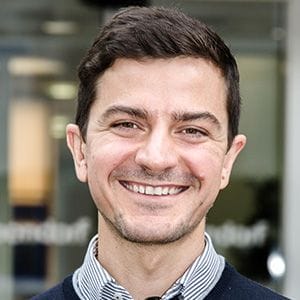Prof. Platt is recognized for his focus on developing and applying cutting-edge gene editing and synthetic biology technologies that address urgent and fundamental needs in biomedical research. In this interview, he speaks about his career and offers advice to early researchers.

ACS Synthetic Biology, in partnership with The American Institute of Chemical Engineers, is proud to announce the winner of the 2024 ACS Synthetic Biology Young Innovator Award:
Prof. Randall J. Platt, ETH Zurich, Switzerland
This award recognizes an outstanding early career investigator conducting research in any area of synthetic biology. Prof. Platt is recognized for his focus on developing and applying cutting-edge gene editing and synthetic biology technologies that address urgent and fundamental needs in biomedical research. His track record demonstrates a series of impactful innovations, including two lines of research that revolutionized how we interrogate gene function and record gene expression information in the DNA of living cells.
Prof. Platt will be honored during the 2024 Synthetic Biology: Engineering, Evolution & Design (SEED) meeting on June 24 – 27, 2024, in Atlanta, Georgia. Learn more about Prof. Platt and his research below.

Prof. Platt is an Associate Professor of Biological Engineering at the ETH Zurich; Associate Professor at the University of Basel; Botnar Research Center for Child Health Investigator; and NCCR Molecular Systems Engineering Investigator. He aims to develop genetic perturbation and cellular programming technologies for diagnostics and therapeutics primarily in the areas of brain science and gut microbiome. Prof. Platt’s major research interests include biological engineering, synthetic biology, functional genomics, and molecular medicine. His core research themes include engineering microbial cells to record and manipulate intestinal physiology and the gut microbiota; the development of new gene editing methods with a particular focus on in vivo and multiplexing applications; and high throughput forward genetic screening in vivo in animal models to identify disease drivers, diagnostic biomarkers, drug targets, and delivery vectors.
Prof. Platt’s research accomplishments have earned numerous distinctions, including the MIT Technology Review’s Innovators Under 35, Eppendorf Award for Young European Investigators, Stanisław Lem European Research Prize, EMBO Young Investigator, and ETH Zurich Latsis Prize.
Read the Interview with Prof. Platt
What does this award mean to you?
I am incredibly grateful for this award. To me, the award validates that the work my lab has been doing is appreciated by the community and is hopefully advancing science in some small way.
How would you describe your research to someone outside your field of research?
We develop tools to manipulate genes and cells in ways that were not previously possible. For example, with one of the technologies we developed, called Record-seq, we can make bacterial cells record their gene expression, captured as snippets of RNA that are converted to DNA and archived within their genomes. Through DNA sequencing we can then reveal the history of a population of bacterial cells. This is useful for understanding the behavior of bacteria as well as understanding the environments they live in, such as the human gastrointestinal tract. We are currently working on using this technology to engineer living bacterial diagnostics and therapeutics.
What do you think is the biggest challenge currently in your area of research?
One of the biggest challenges in my research area is realizing the long-term translational potential of Record-seq as well as living diagnostics and therapeutics. Converting academic innovations to medical products that help patients, especially when they are based on genetically engineered bacteria and radically new technology, is not straightforward. The challenges ahead span the topics of research and development, clinical safety and efficacy, regulation by health and environmental authorities, venture financing, and business.
What is next in your research?
I am very excited to leverage Record-seq technology as a platform technology enabling the creation of living diagnostics and therapeutics that can help people. To achieve this, we are advancing the science around understanding the connection between the gut and health as well as engineering the next generation of bacterial chassis for translational applications.
Have there been any highlights in your career to date that you are especially proud of?
A big highlight of my career has been the ability to work with many excellent individuals. While experimental results and published papers are fleetingly satisfying, seeing individuals in my group become better scientists, have children, graduate, help one another, and work together towards a common goal makes me very proud and has a long-lasting impact.
What would your advice be to someone just starting out in the field?
For those new to the field, I would strongly encourage taking an interdisciplinary approach and pursuing a research direction where you see yourself being interested beyond proof of principle.

